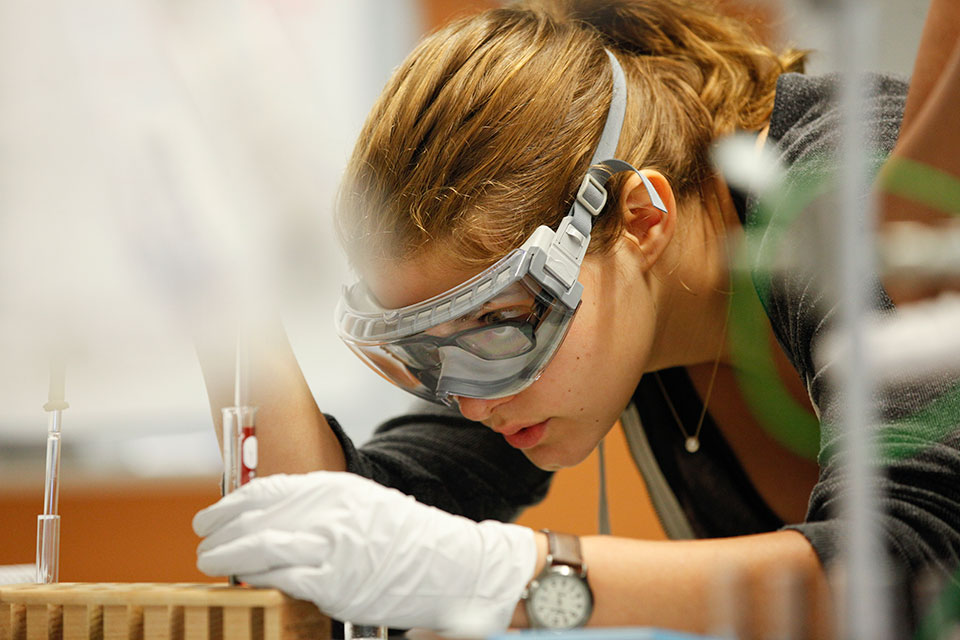First Year Placement in CHEM 11A, 15A, or 25A

Placing Yourself in Chemistry
Student success in introductory chemistry depends primarily on two things, skills and commitment. The latter is up to you, but we can help you with the former. Because students enter college with varying problem-solving skills from their high school experiences, different introductory chemistry sequences are offered at Brandeis University.
CHEM 11 (General Chemistry) is the course for students with one year or less of high school chemistry. CHEM 11 assumes successful math preparation through pre-calculus, and is taken by about 3/4 of the students in introductory chemistry. CHEM 11 requires fluency working with algebraic expressions, exponential terms, and logarithms. Students who have not taken pre-calculus are strongly advised to take MATH 5 in their first (or second) semester at Brandeis, and postpone taking General Chemistry until their second year. If you are unsure about your math preparation, try to complete the Chemistry 11a/15a placement exam without a calculator. Click on the answer to each question to determine your score. An adequate score for Chem 11a would be approximately 7 correct answers; for Chem 15a, most students would miss only a couple of items on this exercise.
CHEM 15 (Honors General Chemistry) is for students with stronger preparation and/or considering a major in chemistry, chemical biology or biochemistry. CHEM 15 assumes some basic chemistry and math preparation and explores advanced topics relevant to chemical science majors. It is the course of choice for students with two years of high school chemistry or a successful year of high school chemistry with AP chemistry (3-5) or AP physics or AP calculus.
Recitations. In addition to the lecture section, which meets three mornings per week, CHEM 11 has a mandatory afternoon recitation. There are three recitations held per week. Students in CHEM 11 will register for one section, but are welcome to attend others. Many students find it helpful to have the time available to attend more than one recitation per week. Quizzes and tests in CHEM 11 are given on Friday mornings.
CHEM 15 has a mandatory Wednesday evening session, but no additional recitation requirements.
Guidelines for Choosing Between Courses:
- If you are uncomfortable with math, consider postponing introductory chemistry until you have successfully completed Math 5a, especially if you have not previously had a successful year of high school chemistry or physics. Remember, taking the course successfully is more important than taking it early! You may address questions about postponing introductory chemistry to Professors Murray (murray@brandeis.edu), Jee (jjee@brandeis.edu), or Lutz (seanlutz@brandeis.edu).
- If you have had two years of high school chemistry or a successful year of high school chemistry and/or have done well in AP chemistry (3-5) or AP physics or AP calculus, then you should enroll in CHEM 15a and the associated laboratory CHEM 19a. Questions about enrolling in honors chemistry may be addressed to Professors Murray (murray@brandeis.edu), Jee (jjee@brandeis.edu), or Schmidt-Rohr (srohr@brandeis.edu).
- Students with AP (4 or 5), IB Chemistry (score 5 or greater), or UK-type A-level exam (A, B, or C grade) may take Organic Chemistry Lecture and Laboratory courses (CHEM 25a and CHEM 29a). Organic chemistry focuses on the structure and reactivity of carbon-based molecules, and has direct implications in a variety of fields including biology and biochemistry. These courses are required for most science-related undergraduate programs as well as application to many graduate programs. Taking organic chemistry in your first year allows more time in subsequent years to take advanced courses and carry out research. Students considering this option are encouraged to consult with Professors Murray (murray@brandeis.edu) or Jee (jjee@brandeis.edu). Note: students electing to take AP credit for first-year chemistry must begin their chemistry career at Brandeis University with CHEM 25a. Most students who begin their studies with CHEM 25/29 receive grades in these courses in the A to B-minus range, with AP 4 students performing at levels slightly below those of AP 5 students.
If you do not have AP 4, AP 5, an IB score of 5 or greater, or advanced A-level status, you may not begin with CHEM 25/29 and must take CHEM 11/18 or CHEM15/19 first.
Pre-enrollment Process:
- Before registration:
Consider your previous experience carefully and choose a chemistry lecture and laboratory course. Remember that both your success and your enjoyment of your chemistry course this year will depend on an honest appraisal of the program that will best serve your needs and goals.
Be sure to review your other course options with a view to flexibility in the afternoons. The chemistry laboratory sections have limited enrollments and you will need to work your other classes around the availability of laboratory slots. - Registration:
- Enroll in a chemistry lecture course, CHEM 11a or 15a. The lecture course is a full course, worth four credits.
- Enroll in the corresponding chemistry laboratory course, CHEM 18a for students in CHEM 11a, and CHEM 19a for students in CHEM 15a. Each week (10 weeks/semester), a student attends a four- hour lab session and an 80-minute lab lecture. The lectures for CHEM 18 and CHEM 19 are scheduled in the same time block to allow flexibility in placement. The laboratory course is a half course, worth two credits.
- Completing registration:
Confirm your registration. Do not simply accept the statement that your requested transactions have been completed. Check that you have been enrolled in a lecture course and in a laboratory course.